BSc Agriculture means bachelor of science and birthplace of India where agriculture-related subjects are studied. BSc Agriculture is a vast sector which plays an important role in improving the economic condition of India. Many other courses also come under BSc Agriculture like BSc Horticulture, Forestry, and BTech Agriculture. All these fields of agriculture are included in BSc Agriculture. In a country like India, where agriculture contributes approximately 25 to 30% to the GDP, knowledge of BSc Agriculture is very important to achieve agriculture-related new technology, higher-yielding crop variety, and good quality animal products.
What is BSc Agriculture? related In this article, we will consider everything from preparation for BSc Agriculture to jobs after BSc Agriculture
Table of Contents
Details about what is BSc agriculture

This is a four-year undergraduate program. To gain admission, one must qualify for the entrance exam. In this undergraduate program, theoretical knowledge is provided along with practical knowledge. The program has eight semesters, during which multiple agriculture-based subjects are studied. Here is some information in short.
| Parameters | details |
|---|---|
| Course Level | undergraduate |
| Course years | 4 year |
| Course semester | 8 semester |
| Fees/sem. | government colleges – 15000- 17000₹ private colleges – 50000-60000₹ |
| Eligibility | 10+2 in agriculture, science and math groups |
| Admission criteria | entrance exams like – MPPAT, ICAR, CGPAt, CUET MHT, CET, etc |
| Core subject in Bsc ag. | agronomy, horticulture, genetics, plant breeding, economy, etc |
| Annual salary | 10+2 in agriculture, science, and math groups |
BSc Agriculture importance in India
Why B.Sc Agriculture degree and study of agriculture is significant in India? There are many regions…
1, Foundation of Indian economy-
India’s GDP share of agriculture is about 17-18%, and about half of the population is employed in this sector. Earning an agriculture degree prepares students to enhance farming practices necessary for the development of the economy.
2, food security-
India is confronted with the challenge of providing food for its population which is increasing daily. Those professional graduates can contribute to some aspects of production by increasing crop production, minimizing post-harvest losses, and enhancing sustainable agriculture practices which are imperative for the nation.
3, Rural development-
Indian economic growth, new technology development, and high productivity are significant for rural development and to make this easy, knowledge of agriculture is essential which can be obtained through BSc Agriculture.
4, Agriculture innovation-
In the agriculture sector, new technology plays an important role for farmers which not only reduces their time but also helps in increasing their farm production. BSc Agriculture is important in innovations like drones, precision agriculture, biotechnology, etc.
5, Employment development-
This is such a field in which there are career opportunities in many government and private sectors. If someone wants to open his own business, the government also provides loans at low interest rates to agriculture graduates. like goat farming, poultry farming, and fishery farming, and the government also gives support for purchasing agricultural equipment like tractors, and tillage equipment which can generate employment.
Why study BSc in agriculture?
There are many reasons why we should do BSc Agriculture after 12th
1, Diverse career opportunities –
After BSc, many career options are available in India like the government sector agriculture officer, agriculture development office extension officer, private sector company like syzanta, Agrostar, agrotech, FMC, etc, or you can start your own business.
2, Difference in other degrees-
This is a practical and exploring field which makes it completely different from other degree programs. Apart from government jobs, there are many opportunities available in the private sector. Or after a BSc in agriculture, you can start your own business based on that knowledge.
3, Entrepreneurship opportunity –
Agriculture presents various opportunities for entrepreneurship, whether it’s launching your farm, starting an agribusiness, greenhouse production, animal production, or creating innovative agricultural products or services.
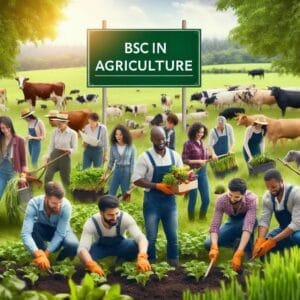
Eligibility criteria for BSc agriculture
Educational Qualification:
You must have completed your 10+2 education with agriculture, and Science subjects (Physics, Chemistry, Biology/Mathematics).
Minimum Marks:
In 12th – Most colleges require a minimum of 50% aggregate marks, though this can vary.
In any entrance exam-
Mp pat- minimum 60 to 80 out of 200marks
Cgpat- minimum 70 to 90 out of 200marks
Age Limit:
Generally, there is no upper age limit, but some colleges may set specific criteria.
BSc Agriculture Entrance exams in India
In India, there are two types of entrance exams for doing a BSc Agriculture degree, state-level and central-level exams. The central entrance exam is a little difficult compared to the state-level exam. There is no minimum marking in these exams(state exams). This is an exam taken to test the ability of the students.
There are two types of exams conducted in India
1, Central-level exams
2, State-level exams
What is BSc agriculture Central-level Entrance exams-
Exams like ICAR, CUET, etc. are central entrance exams. Admission is provided through these exams to central agriculture universities. Their syllabus and difficulty level are higher than state-level entrance exams.
What is BSc agriculture State-level entrance exams –
State-level entrance exams provide maximum opportunities to students for admission to BSc Agriculture University. Every state conducts its entrance exams to get admission to BSc Agriculture. Like MP- MPPAT, CG- CGPAT, MH- MHT CET, etc.
Here’s a detailed table summarizing what is BSc Agriculture entrance exams at both state and central levels for 2025…
| Exam name | level | Exam date | Paper question no. | total marks | Allowed colleges |
|---|---|---|---|---|---|
| ICAR AIEEA/UG | Central level | may/2025/ (tentative) | 150 | 600 | All ICAR-affiliated colleges |
| JET | State (Rajasthan) | June/2025 (tentative) | 200 | 400 | Rajasthan Agricultural University, Bikaner |
| AP EAMCET | State(Andhra Pradesh ) | may/2025 (tentative) | 160 | 160 | Acharya N.G. Ranga Agricultural University |
| TS EAMCET | State ( Telangana) | may/2025 (tentative) | 160 | 160 | July/2025 (tentative) |
| WBJEE | State (west Bengal) | April/2025 (tentative) | 100 | 200 | Bidhan Chandra Krishi Viswavidyalaya |
| MHT CET | State (Maharashtra) | may/2025 (tentative) | 200 | 200 | Maharashtra Animal and Fishery Sciences University |
| CGPAT | State (Chhattisgarh) | may/2025 (tentative) | 200 | 200 | Indira Gandhi Agricultural University |
| MPPAT | State (Madhya Pradesh) | June/July/2025 (tentative) | 200 | 200 | JNKV(Jabalpur) |
| PU CET | State (Panjab) | June/July/2025 (tentative) | 180 | 180 | Punjab Agricultural University |
What is BSc agriculture and its syllabus

There are 8 semesters in BSc Agriculture, in which there are approximately 6 to 10 subjects each semester and their practicals are also there. 1st semester is fundamentally based, in which fundamental subjects like agronomy, horticulture, forestry, and sociology are studied. The last two semesters are practical based, in which activities like village visits, KVK research, development of mushrooms, and vermicompost are included. In our 2nd to 7th semesters mostly theoretical knowledge is targeted.
Here’s a brief overview of what you can expect in each semester:
First-semester subjects-
- Fundamentals of Horticulture 2 (1+1)
- Fundamentals of Plant Biochemistry and Biotechnology 3(2+1)
- Fundamentals of Soil Science 3(2+1)
- Introduction to Forestry 2 (1+1)
- Comprehension & Communication Skills in English 2 (1+1)
- Fundamentals of Agronomy 4(3+1)
- Introductory Biology* 2 (1+1)
- Elementary Mathematics* 2(2+0)*
- Agriculture Heritage* 1(1+0)*
- Rural Sociology & Educational Psychology 2 (2+0)
- Human Values & Ethics** (non gradual) 1(1+0)*
- NSS/NCC/Physical Education & Yoga Practices* 2 (0+2)
Second-semester subjects
- Fundamentals of Genetics 3(2+1)
- Agricultural Microbiology 2(1+1)
- Soil and Water Conservation Engineering 2(1+1)
- Fundamentals of Crop Physiology 2(1+1)
- Fundamentals of Agricultural Economics 2(2+0)
- Fundamentals of Plant Pathology 4(3+1 )
- Fundamentals of Entomology 4(3+1)
- Fundamentals of Agricultural Extension Education 3(2+1)
- Communication Skills and Personality Development 2(1+1)
Third-semester subjects
- Crop Production Technology – I (Kharif Crops) 2 (1+1)
- Fundamentals of Plant Breeding 3 (2+1)
- Agricultural Finance and Cooperation 3 (2+1)
- Agriculture Informatics 2(1+1)
- Farm Machinery and Power 2 (1+1)
- Production Technology for Vegetables and Spices 2 (1+1)
- Environmental Studies and Disaster Management 3(2+1)
- Statistical Methods 2(1+1)
- Livestock and Poultry Management 4 (3+1)
Furth-semester subjects
- Crop Production Technology –II (Rabi Crops) 2(1+1)
- Production Technology for Ornamental Crops, MAP and Landscaping 2(1+1)
- Renewable Energy and Green Technology 2(1+1)
- Problematic Soils and their Management 2(2+0)
- Production Technology for Fruit and Plantation Crops 2(1+1)
- Principles of Seed Technology 3(1+2)
- Farming System & Sustainable Agriculture 1(1+0)
- Agricultural Marketing Trade & Prices 3(2+1)
- Introductory Agro-meteorology & Climate Change 2(1+1)
- Elective Course 3 credit
Fifth-semester subjects
- Principles of Integrated Pest and Disease Management 3(2+1)
- Manures, Fertilizers and Soil Fertility Management 3 (2+1)
- Pests of Crops and Stored Grain and their Management 3 (2+1)
- Diseases of Field and Horticultural Crops and their Management -I 3 (2+1)
- Crop Improvement-I (Kharif Crops) 2 (1+1)
- Entrepreneurship Development and Business Communication 2 (1+1)
- Geoinformatics and Nano-technology for Precision Farming 2 (1+1)
- Practical Crop Production – I (Kharif crops) 2 (0+2)
- Intellectual Property Rights 1(1+0)
- Elective Course 3 credit
fundamental of Agriculture book PDF download vol-1
Fundamental of Agriculture book PDF download vol-2
Sixth-semester subject
- Rainfed Agriculture & Watershed Management 2 (1+1)
- Protected Cultivation and Secondary Agriculture 2 (1+1)
- Diseases of Field and Horticultural Crops and their Management-II 3 (2+1)
- Post-harvest Management and Value Addition of Fruits and Vegetables 2 (1+1)
- Management of Beneficial Insects 2 (1+1)
- Crop Improvement-II (Rabi crops) 2 (1+1)
- Practical Crop Production –II (Rabi crops) 2 (0+2)
- Principles of Organic Farming 2 (1+1)
- Farm Management, Production & Resource Economics 2 (1+1)
- Principles of Food Science and Nutrition 2(2+0)
- Elective Course 3 credits
Seventh-semester subjects
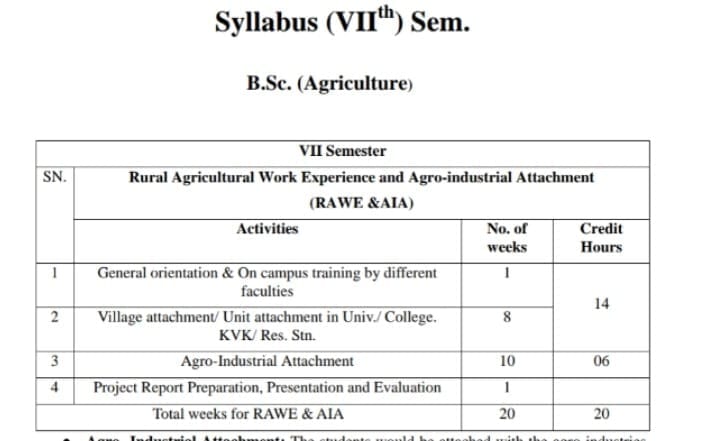
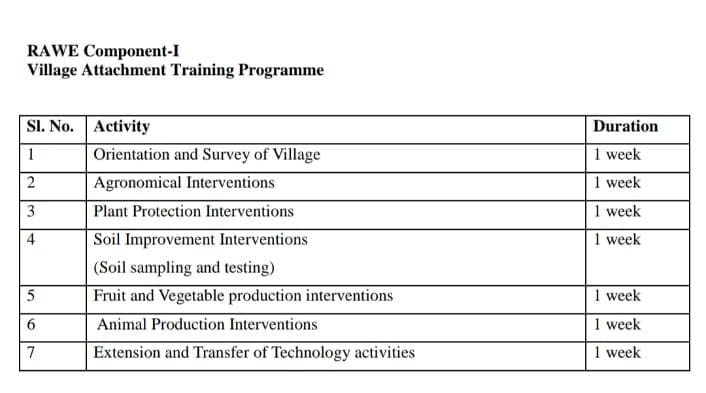
In this course of 8 semesters, the last 2 semesters are practical based. In the 7th semester, work like field visits, KVK visits, and agro-industry visits are done.
eight-semester subjects
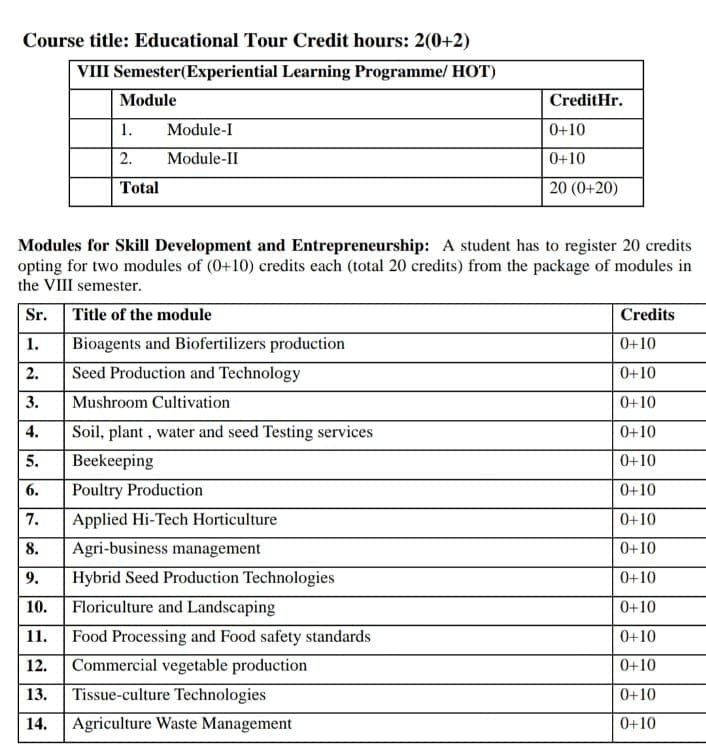
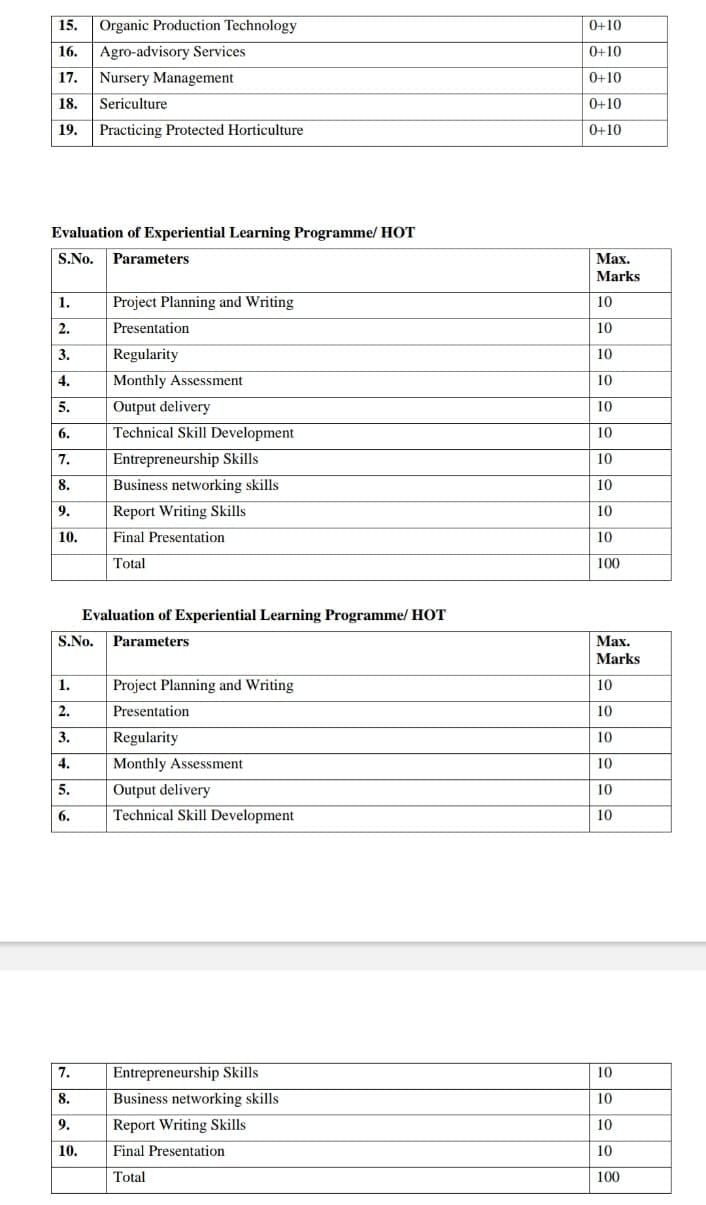
This is the last semester of BSc Agriculture. There are two modules in it. In these modules, tasks like personality development, communication skills, vermicompost production, and mushroom production are completed.
**highlights – At the end of the subjects (2+1),(4+1), and (1+1) credits are given, its meaning shows the weightage of the theory and practical portion in that subject. This means in (2+1) 2 means theory and 1 means practical.
what is BSc agriculture elective courses?
Elective subjects are those subjects that are prepared in colleges apart from the semester. These are optional subjects that students can choose as per their choice or can even skip them.
Some elective courses-
- Agribusiness management
- Agrochemical
- Commercial plant breeding
- Soil, plant water, and seed testing
- Landscaping
- Agricultural waste management
- Food safety issue
- Biopasticide and biofertilizer
- Protected cultivation
- Micropropagation technology
- Hi-tech horticulture
- Weed management

BSc agriculture admission process
Downloaded nemraj Sunda’s book click here

In India, there are different types of admission criteria for BSc Agriculture colleges, some colleges give admission directly based on the 12th percentage, some conduct their entrance exams and in government colleges, admission is given based on marks in entrance exams at the central and state level colleges.
1, Direct Admission
Some colleges, mostly private colleges, provide admission based on the 12th marks of the students. Counseling is done based on the 12th percentile and our final merit list is released and we are given admission.
2, Entrance exams
ICAR, MPPAT, CGPATA, CUET, etc. are all entrance exams that help get admission to BSc Agriculture. One gets admission to central and state-level agriculture universities. after passing these exams. Some admission steps in BSc agriculture colleges…
1, Check eligibility criteria
* Educational Qualification-
complete 10+2 with science, math, agriculture
* Minimum marks-
Most colleges require a minimum aggregate of 50% in 10+2, although some prestigious institutions may have higher requirements.
* Age limit-
No age limit required
2,.Application process –
* Online application
*Upload documents – 10 and 12th mark sheet, Adhar card, passport size photo, email ID, etc.
* Application fees- 250 rupes ( based on your cast)
3. Entrance exams–
Admission to most agricultural universities in India is based on entrance exams. Here are some common entrance exams.
Example- ICAR AIEEA, MHTCET, KEAM, MPPAT, CGPAT
4. Merit list and counselling–
after the entrance exam results are announced on the official university website. universities will release merit lists based on the candidates’ performance.
The next steps include-
*Counseling process-
Qualified candidates are invited for a counselling session where they can choose their preferred college and course specialization.
*Choice filling –
During counselling, you must submit your preferences for colleges and programs. Your final admission depends on your rank and seat availability.
*Seat allotment-
Based on merit and availability, you’ll be allotted a seat in a college
5, Final admission-
After being allotted a seat the final admission process including
1, document verification
2. Collage Fee payment
3. Enrollment
All Documents required for BSc agriculture admission
Here are the required document names for BSc Agriculture admission:
- 10th Marksheet
- 12th Marksheet
- Entrance Exam Scorecard
- Admit Card (Entrance Exam)
- Transfer Certificate (TC)
- Character Certificate
- Caste/Category Certificate
- Domicile Certificate
- Income Certificate
- Migration Certificate
- Passport-Sized Photographs
- Medical Certificate
- Aadhaar Card/Identity Proof
- Proof of Address
- Provisional Allotment Letter (from counselling)
- Gap Certificate (if applicable)
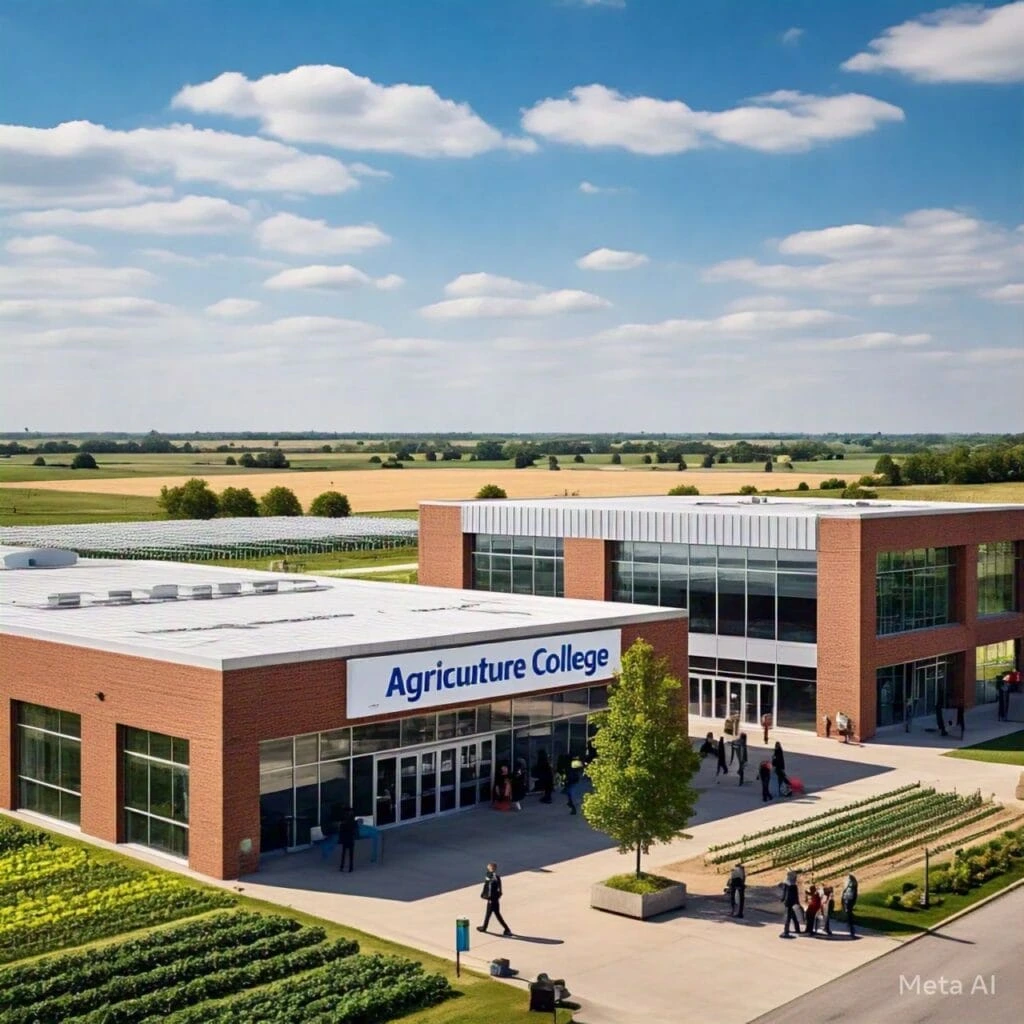
BSc Agriculture best colleges in India
India has a large number of institutions offering B.Sc Agriculture programs, with both government and private colleges. As of the latest data, there are 334( approx) government and 618(approx) private colleges across the country that offer B.Sc in Agriculture.
Top 10 government colleges in India

1. Indian Agricultural Research Institute (IARI), New Delhi
2. Punjab Agricultural University, Ludhiana
3. Tamil Nadu Agricultural University, Coimbatore
4. G.B. Pant University of Agriculture & Technology, Pantnagar
5. Acharya N.G. Ranga Agricultural University, Guntur
6. Kerala Agricultural University, Thrissur
7. Chaudhary Charan Singh Haryana Agricultural University, Hisar
8. University of Agricultural Sciences, Bangalore
9. Dr. Y.S. Parmar University of Horticulture and Forestry, Solan
10. Rajasthan collage of agriculture, Udaipur
Top 10 private colleges in India

1, Lovely Professional University (LPU), Punjab
2, Sharda University, Greater Noida
4, SRM Institute of Science and Technology, Chennai
5, Vellore Institute of Technology (VIT), Vellore
6, Sanskriti University, Mathura
7,Parul University, Vadodara
8, Noida International University, Noida
9, RIMT University, Punjab
10, Galgotias University, Greater Noida
Top 5 colleges in Madhya Pradesh
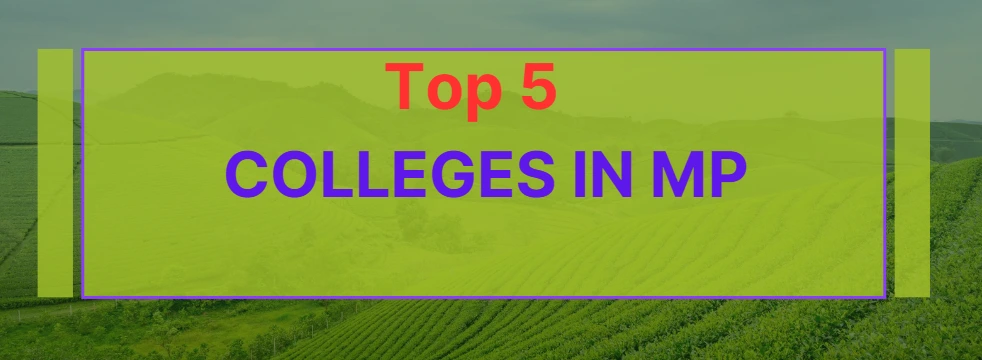
1. Jawaharlal Nehru Krishi Vishwa Vidyalaya (JNKVV), Jabalpur
2. Rajmata Vijayaraje Scindia Krishi Vishwa Vidyalaya (RVSKVV), Gwalior
3. Mahatma Gandhi Chitrakoot Gramodaya Vishwavidyalaya (MGCGV), Chitrakoot, Satna
4. Renaissance University, Indore
The fee structure in government /private collages
Government colleges –
In every government college, the fees per semester for BSc Agriculture is very low. Approximately, the fees per semester range from 15000 to 35000₹. But in these colleges, scholarships are provided to the students by the government which is equal to their fees. That means, in maximum government colleges, the fees go up to 0₹.
Private colleges –
If we talk about the fees of private colleges, it is 2 to 3 times more than government colleges, like LPU University’s fees are 110000 to 120000 rupees per semester. Apart from this, exam fees and program fees are also expensive which increases the fees of private colleges even more.
Career options after BSc agriculture
After completing a B.Sc in Agriculture, various career options are available in both the private and government sectors. These careers range from roles in farming, research, agribusiness, new technology, and policy-making to technical and educational fields.

Top 10 Government jobs in India-
| Job Title | Salary Range/month | Job Description |
|---|---|---|
| Agriculture officer(AO) | ₹ 40000- ₹ 70000 | implement agriculture policies |
| ICAR scientist | ₹56000- ₹1,77,500 | conduct research in agriculture |
| National Seeds Corporation officer | ₹40000- ₹60000 | Forest range officer |
| Agriculture field officer(AFO) | ₹30000- ₹50000 | Works with rural banks providing financial assistance to farmer |
| National Seeds Corporation officer | ₹40000- ₹65000 | Manage forest resources |
| Agriculture extension officer | ₹35000- ₹60000 | Bridges research and farming communities, spreading new technology |
| soil conservation officer | ₹45000- ₹75000 | Focuses on soil conservation and erosion control measure |
| food safety officer | ₹40000- ₹50000 | ensure the quality and distribution of seed to the farmer |
| Rural development | ₹45000- ₹65000 | implements rural development projects |
| State agriculture department | ₹30000- ₹60000 | manage state-level agriculture growth |
More about Agriculture field officer
Food corporation of india
Top 10 Private Jobs in India.
| Job title | Salary range /per annum | Job description |
|---|---|---|
| Agronomist | ₹4 – ₹8 lakhs | Advises farmers on crop production, soil management, and fertilizers. |
| Agriculture concultant | ₹5 12 lakhs | Provides expert advice to farmers |
| Plant breeder | ₹4 – 9 lakhs | Develops new and improved plant varieties through research. |
| Agriculture sales executive | ₹3 – ₹7 lakhs | Sells agricultural products like seeds, fertilizers, and equipment. |
| Food safety officer(private) | ₹3.5 – ₹6 lakhs | Ensures food products meet safety and quality |
| Supply chain manager | ₹6-12 lakhs | Manages the supply chain of agricultural products |
| Dairy technologist | ₹4 – ₹8 lakhs | Works in dairy production |
| Agriculture research scientist | ₹5-10 lakhs r | Conducts research for private companies |
| Agri-business manager | ₹7 – ₹15 lakhs | agribusinesses management |
| Agriculture export manager | ₹6-14 lakhs | Manages the export process for agricultural products |
Higher education–
If any student after BSc agriculture (under graduation) wants to go towards higher education apart from government and private jobs. then he can select this career option and after BSc, he can complete post-graduation which is of 2 years, in which scholarship is also provided which can be from ₹ 15000 to ₹ 25000 which can be different according to each university.
Research fellowship –
Working in agricultural research institutes like ICAR IARI, JNKV, and TANU, conducting field research and other works related to agricultural

Entrepreneurship –
After a BSc in agriculture, we can move towards entrepreneurship in which we can see agriculture as a business and make it our best career option.
After BSc agriculture, we can start our journey by choosing these 10 business ideas….
- Organic farming
- Agri – tourism
- Dairy farming
- Agri tech startup
- Agriculture equipment rental
- Food processing and packaging
- Agro based manufacturing
- Poultry farming
- Floriculture
- Mushroom farming
[WPSM_AC id=116]
conclusion
‘What is BSc agriculture’ In conclusion, B.Sc Agriculture is not just a degree but a gateway to numerous opportunities in both the government and private sectors. The course provides students with a strong foundation in agricultural science, preparing them to tackle global challenges like food security, sustainable farming, and rural development. With the increasing focus on technological advancements in agriculture, graduates can explore diverse career paths, including government roles, agribusiness, research, and entrepreneurship. Furthermore, the eligibility criteria, entrance exams, and admission processes make it accessible to students from various academic backgrounds.
Related post
Do you know an agriculture field officer(AFO)
